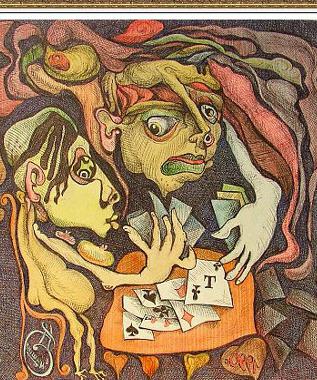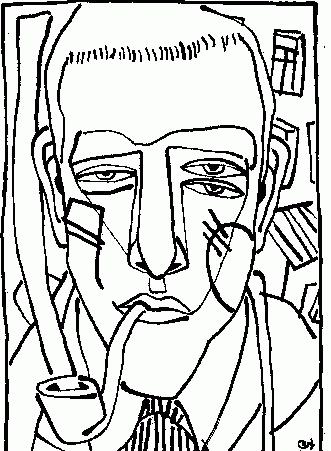1928 year. The Leningrad Press House is thrilled by the performance of young outrageous writers who call themselves Oberiuts. They recited verses written by Zaum, staged an absurdist “Elizabeth Bam”, and to top it all off, they showed the world an editing film with the promising title “The meat grinder”. Chief among the Oberiuts was Daniil Harms, whose biography became the topic of this article.
early years
The future poet was born on December 30, 1905. The penchant for writing was transferred genetically to Daniel: his father, who corresponded with Chekhov and Tolstoy, was known not only for revolutionary activity, but also for pen samples, and his mother was a noblewoman and ran a shelter. A brief biography of Daniel Harms includes a mention of his brilliant education at a privileged German school. After the revolution, he was listed in the Leningrad Electrotechnical School, from where he was expelled with the wording “weak attendance”, inactivity in public works.
The origins of literary activity
When did Harms Daniil Ivanovich, whose biography was the subject of many studies, change the name of Yuvachev and finally believe in his writing talent? The first use of the pseudonym was in the early 1920s. They tried to find the answer to the Harms surname (as well as its many variants, among them Kharms, Haarms and Karl Ivanovich from nowhere) from numerous dialects. The most plausible analogies with English and French should be recognized. If in the first harm is “harm”, in the second a similar word means charm, attractiveness.
Around then, Harms wrote his first poetic works. As a guide, he chooses Khlebnikov, or rather, his close admirer A. Tufanov. Subsequently, the “Order of the Wise Men” will replenish with such a talented poet as Daniil Harms. His biography also testifies that in 1926 he joined the All-Russian Union of Poets, from where he was expelled due to non-payment of contributions.
OBERIU
In the first half of the 1920s, Kharms became acquainted with Vvedensky and Druskin, who were the founders of the Chinar circle. Subsequently, Daniel will also enter there, having decided to rally all the "left" writers under one name, one group - OBERIU. This complex abbreviation stands for “Association of Real Art”. Interestingly, in the group’s manifest, published in 1928, the Oeriuts declared the Zaumi school the most hostile to themselves. Harms renounced the destruction of the word, the usual game of nonsense. The purpose of their group was global in nature and projected onto the outside world. Oberiuti sought to clear the subject of "literary husk", to make its perception more real. This applies both to his obviously avant-garde experiments (poems “Evil collection of infidels”, “I sang ...”), and works that are humorous in nature.

Harms also explains the phenomenon of absurdity in prosaic miniatures like “Blue Notebook No. 10”, “Sonnet”, “Falling Out Old Women”. In his opinion, the logic of art should be different from everyday. Harms cites as an example the case when, contrary to anatomical laws, the artist turned a little the shoulder blade of the main character, which, however, does not prevent us, the audience, from admiring the beauty of the depicted nature. He also created dramatic works (for example, the aforementioned "Elizabeth Bam"), which easily fit into the context of the experiments of the remaining Oberiuts.
Artworks for children
How did the biography of Daniil Harms develop further? For children, he began to write in the late 1920s, working with a number of magazines. Other members of OBERIU worked there, however, unlike them, Harms responsibly reacted to his current work, which, by the will of fate, became his only source of income. Poetry and puzzles of the poet were published in magazines; he published a number of books (First and Second, Game, etc.). Some of them were banned or not recommended for mass libraries, others were especially loved among young readers.
Harms in the 1930s
This period was especially difficult for writers who did not want to put their talent on the conveyor. These included Daniel Harms. The biography (autobiography, more precisely) of those times is captured in the sad lines of the poem "On Visiting the Writing House ...". The poet, with surprise and indignation, discovers that his friends turned away from him, who fell into disfavor of the writer. Harms' first arrest took place in December 1931. Formally, the verdict concerned the poet’s activities in the field of children's literature, although the true reason for the arrest was related to OBERIU. Apparently, the Soviet government could not forgive him for the shocking, several scandalous antics characterizing the avant-garde art - as Daniel Harms understood then. The biography of the poet in the 30s is distinguished by a worldview crisis and constant material deprivation. However, his second wife helped him cope with them - Marina Malich, who remained with the poet until the end of his life.

Death
The war has begun. Harms met her with a defeatist mood and unwillingness to participate in it, for which he was arrested a second time. To avoid being shot, Harms feigned insanity. He was placed in a psychiatric hospital, where he died during the terrible events of the blockade of Leningrad. Thus ended his life path Daniil Kharms, whose biography and creative heritage are now of considerable interest.